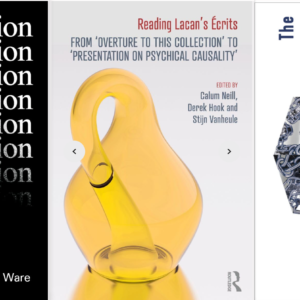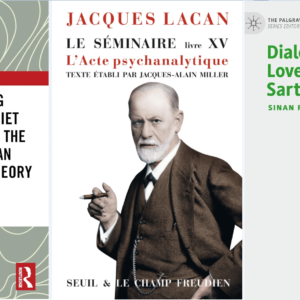News – December 2016
Many new Lacanian publications that will be appearing in 2017 were announced last month. Starting with those out later in January, two new pieces from the Palgrave Lacan Series will be Will Greenshields’ Writing the Structures of the Subject: Lacan and Topology and the collection Perversion Now!, edited by Diana Caine and Colin Wright. Also due to be published by Karnac next month is Pietro Bianchi’s Jacques Lacan and Cinema: Imaginary, Gaze, Formalisation, a Lacanian theorisation of the visual through the study of cinema. Later in the year we will see Alain Badiou and Barbara Cassin’s There’s No Such Thing as a Sexual Relationship: Two Lessons on Lacan published by Columbia University Press in March; Lorens Holm’s intriguingly-named Lacan for Architects in May; and Lilian Munk Rosing’s Pixar with Lacan: The Hysteric’s Guide to Animation also appear in May, from Bloomsbury.
December itself meanwhile saw the publication of Jennifer Murray’s Reading Alice Munro with Jacques Lacan, in which Murray argues that the Canadian Nobel Prize winner’s short stories “trace the contours of the opaque place beyond the pleasure principle, the place where jouissance infuses the text”.
Published in French last month was a collection marking the 50th anniversary of the publication of the Écrits. Lacan 66: Réception des Écrits brings together various pieces from journals, reviews, and newspapers of the time that responded to Lacan’s first published collection. Many that were, of course, bemused by its obscurities and critical of Lacan’s style.
Among the events coming up later this year, the blog for 2017’s NLS Congress, ‘About the Unconscious’, is now live and will be updated regularly ahead of the Congress with content relevant to its theme. Registration is also open on the NLS’s main site here, with the Congress itself takes place in Paris, 29th-30th April.
Whether in preparation for the NLS Congress, or to work on other themes, the NLS last month produced its first cartels newsletter, 4+one, showcasing some of the productions from cartels currently registered with the School. Three papers have been gathered for the first edition, featuring presentations from recent cartels in Dublin and Montreal. More on the context and organisation of cartels on the NLS site here.
The SITE for Contemporary Psychoanalysis will be holding its 2017 conference in collaboration with the Freud Museum London, on 11th-12th March, on the subject of ‘Transgender, Gender and Psychoanalysis’. Speakers include Sheila Cavanagh, Patricia Gherovici, Dany Nobus. Early bird tickets are available until 16 January. More information and a link to book are on the Freud Museum’s site.
The School of the Freudian Letter (London) has announced a series of six seminars for the first half of 2017, running monthly from January to June, to begin the SFL’s formal teaching programme. The first session on 23rd January will be presented by SFL President Richard Klein on ‘Causality in Psychosis’, looking at Lacan’s 1946 paper ‘Presentation on Psychical Causality’ from the Écrits. More info and a link to sign up to the series are here.
Lacanian Compass’ Clinical Study Days 10, with the title, ‘Beyond Oedipus – Family Dramas/Family Traumas’ is coming up in Miami Beach, Florida, 3rd-5th February. Registration is also open now, and at an early bird discount until 3rd January.
Two interesting texts from the blog of this July’s PIPOL 8 Congress appeared last month, centred on the still-ongoing attacks on psychoanalytic interventions in the treatment of autism which have animated French mental health discussion over the last few years. Both are available in English. The first is an interview with Christiane Alberti, President of the Ecole de la Cause freudienne, by Patricia Bosquin-Caroz, Director of PIPOL 8 Congress, in which Alberti discusses the measures the ECF took to bring about the successful rejection of a draft resolution tabled to the French National Assembly by Daniel Fasquelle aiming to “condemn and forbid” the practice of psychoanalysis in the treatment of autism. Alberti lists the latest accusations (all untrue) that motivated this proposal including that psychoanalysts refuse to work with the parents of autistic children, blame mothers, and are in favour of locking up autistic children. Alberti however sees the autism debate in France as “a Trojan horse for the cognitive therapies”, and so the blog https://cause-autisme.fr/ which was set up by leading Lacanians in the heat of this latest battle will continue to be a resource to present the psychoanalytic perspective, and to mobilise opposition to similar attacks in future. The second piece is an article by Gil Caroz, Vice-President of the ECF, who believes in an even more pessimistic vein, that the pyrrhic victory of the overturning of the resolution “does nothing to reassure” given that the motivation for the opposition by French deputies was not the defence of psychoanalysis. The evaluation-based methodologies favoured by most European health authorities present what Caroz calls a “numbers-explains-all” preference that favours cognitive-behavioural practices, which are fundamentally opposed to the psychoanalytic ethic adhering to the absolute singularity of each individual case.
Similarly, in Belgium last month, a new group, APPELpsy (l’Association professionnelle des Psychologues cliniciens de la Parole et du Langage) was formed. Its creation comes in response to the need for mental health professionals to achieve representation at the government Council that is now charged with applying the directives which will govern mental health professionals as a result of the measures put forward by the country’s Social Affairs and Health Minister, Maggie De Block, enacted in June last year (more context, in French, here). Practitioners of the talking therapies in Belgium are requested to add their details in support via the group’s site.
Among journal publications and shorter works from the last month, Stijn Vanheule, Professor of Psychoanalysis at Ghent University, Belgium, published his latest article in Frontiers in Psychology in December. ‘Capitalist Discourse, Subjectivity and Lacanian Psychoanalysis’ looks at four of Lacan’s later Seminars in which the classic four discourses of the master, university, hysteric, and analyst were elaborated, along with the fith that Lacan later proposed in Milan in 1972, the capitalist discourse. Vanheule argues that “in the case of neurosis the discourse of the capitalist functions as an attempt to ignore the sexual non-rapport and the dimension of the unconscious”, while in psychosis, there is an “a priori exclusion from discourse”. A further list of Vanheule’s open access articles for Frontiers in Psychology is available here.
The most recent issue of the journal Parallax, ‘Right in Front of our Eyes’, debates the theoretical inferences of the McGurk effect, and features three papers on Lacan, including one by Alenka Zupančič which takes up the theme from the perspective of social antagonisms, and another by Peter Buse, ‘On the diagonal: Jacques Lacan’s reading lists’.
Finally, as reported last month, the newly-formed Lacan Reading Group taking place at the National Institute of Dramatic Arts, Sydney, Australia, is now producing the fruits of its work. Here is the summary of the contribution from Dr Ehsan Azari entitled ‘Lacan: from Desire to Love’, presented at the group’s first meeting.
Got news? Get in touch.




Leave a Reply